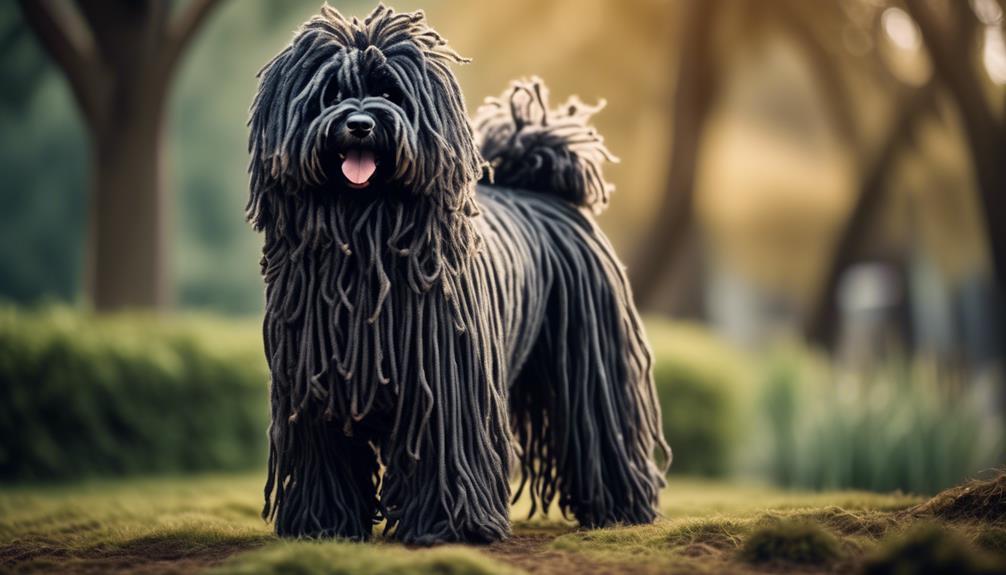
The Puli, like a bundle of tightly wound yarn, is a fascinating breed with a unique set of characteristics. With a history that dates back thousands of years, this Hungarian herding dog has captivated the hearts of many. From its dense and corded coat to its playful and protective nature, the Puli possesses traits that set it apart from other breeds.
But there is much more to discover about this intriguing canine companion. So, sit back and prepare to unravel the secrets of the Puli, as we delve into their fascinating breed information and characteristics.
Key Takeaways
- Puli dogs have a unique corded coat that requires special care and maintenance.
- They are intelligent and agile herding dogs, known for their loyalty and affection towards their families.
- Puli dogs are active and energetic, requiring plenty of exercise and mental stimulation to prevent boredom and destructive behaviors.
- Responsible breeding and health testing are important to prevent common health issues such as hip dysplasia, progressive retinal atrophy, and cataracts in Puli dogs.
Origin and History
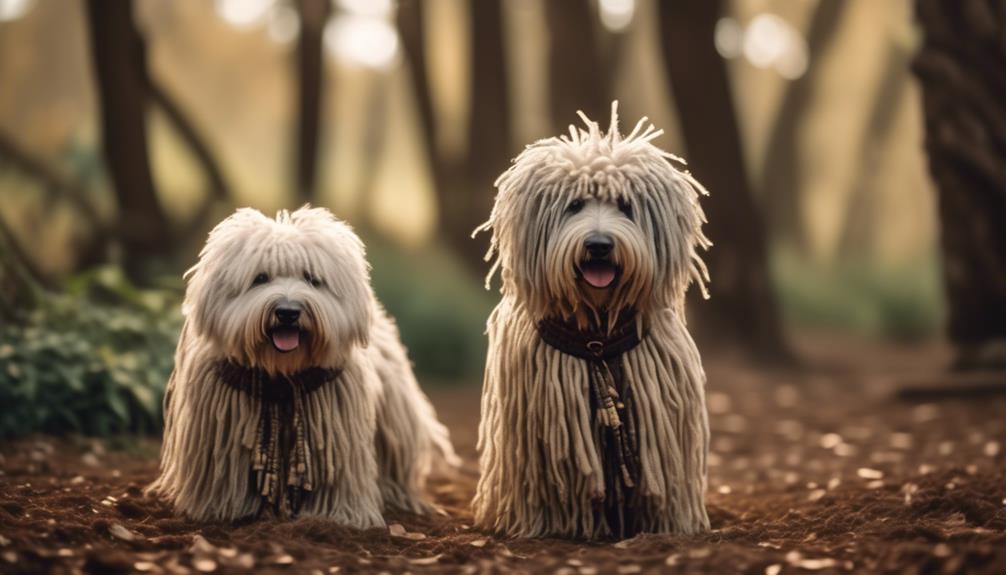
The Puli dog breed has a rich and ancient history. They originated from Hungarian herding dogs that can be traced back 6,000 years ago in Asia. These herding dogs were known for their intelligence and agility, making them excellent companions for shepherds.
The Puli’s unique coat is long and corded like dreadlocks. This coat served as protection from the harsh weather conditions. Over time, the Puli’s popularity spread beyond Hungary, and they became loyal and affectionate companions for families around the world.
Pulis are known for their playful and protective nature, making them great with children and other pets. To keep a Puli happy and healthy, they require plenty of exercise and mental stimulation.
The breed is generally healthy, but like any other breed, they may be prone to hip dysplasia, progressive retinal atrophy (PRA), and cataracts. Responsible breeding and regular health testing are essential to prevent these conditions.
See another Dog breed profile.
Pyredoodle Dog Breed
Size and Lifespan
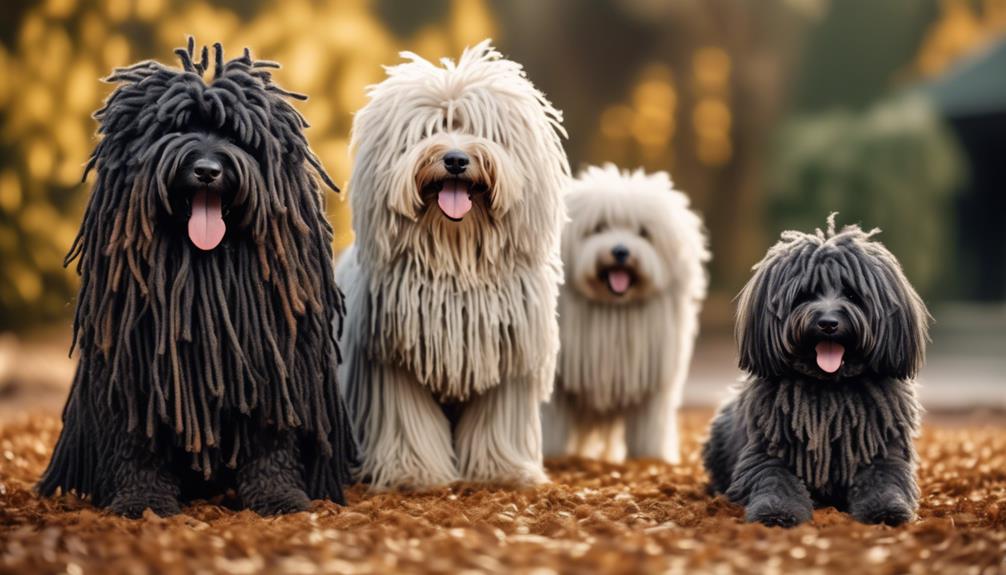
With a medium size and a typical lifespan of 12-14 years, the Puli dog breed is known for its unique characteristics and exceptional qualities.
Pulis are medium-sized dogs, with males slightly larger than females. They’ve a dense and corded coat that can come in black, gray, white, or fawn. This distinctive coat is water-resistant and protects them from cold weather.
Originally bred as herding dogs, Pulis are known for their intelligence and agility. They make loyal and affectionate companions, getting along well with children and other pets.
Due to their active and energetic nature, Pulis require plenty of exercise and mental stimulation. They thrive in large, fenced yards or farms, but can adapt to smaller living spaces with proper exercise.
Coat Colors and Texture
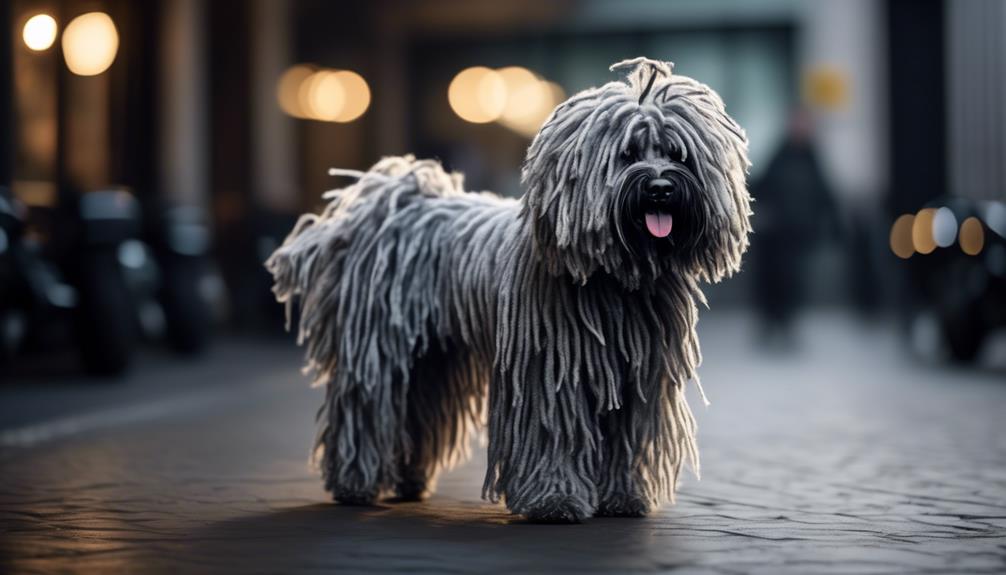
Moving on to the topic of coat colors and texture, the Puli dog breed boasts a wide range of unique and eye-catching variations.
Pulis have a dense and corded coat that resembles dreadlocks. This distinct coat texture is a key characteristic of the breed and provides excellent protection from cold weather.
The coat can come in various colors, including black, gray, white, and fawn. Some Pulis may even have a combination of these colors.
The cords in their coat form naturally as the dog matures, and they require regular maintenance to prevent matting and ensure cleanliness.
The coat not only adds to the Puli’s striking appearance but also serves a practical purpose in their original role as herding dogs.
Temperament and Personality
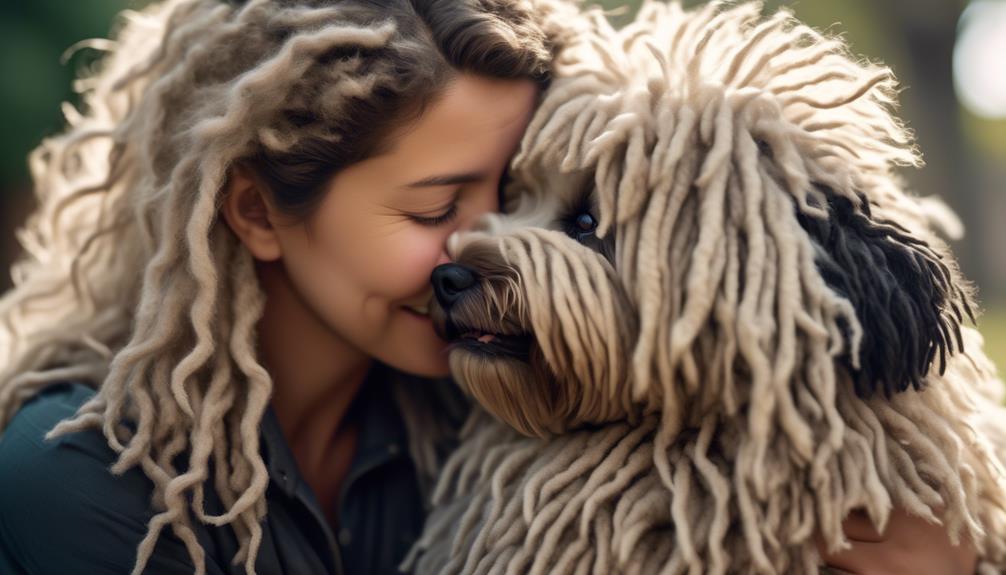
Pulis are known for their intelligent, loyal, and playful temperament. Here are four key characteristics that make them stand out:
- Intelligent: Pulis are highly intelligent dogs, which makes them quick learners and easy to train. They have a natural problem-solving ability and can excel in various activities, including obedience and agility.
- Loyal: These dogs are incredibly loyal to their families and form strong bonds with their owners. They will go to great lengths to protect and defend their loved ones, making them excellent guard dogs.
- Playful: Pulis have a playful and energetic nature. They enjoy engaging in interactive games and activities, making them wonderful companions for active individuals or families with children.
- Affectionate: Despite their independent streak, Pulis are known to be affectionate and loving towards their families. They thrive on human companionship and enjoy being involved in their owners’ daily lives.
Unique Coat Characteristics
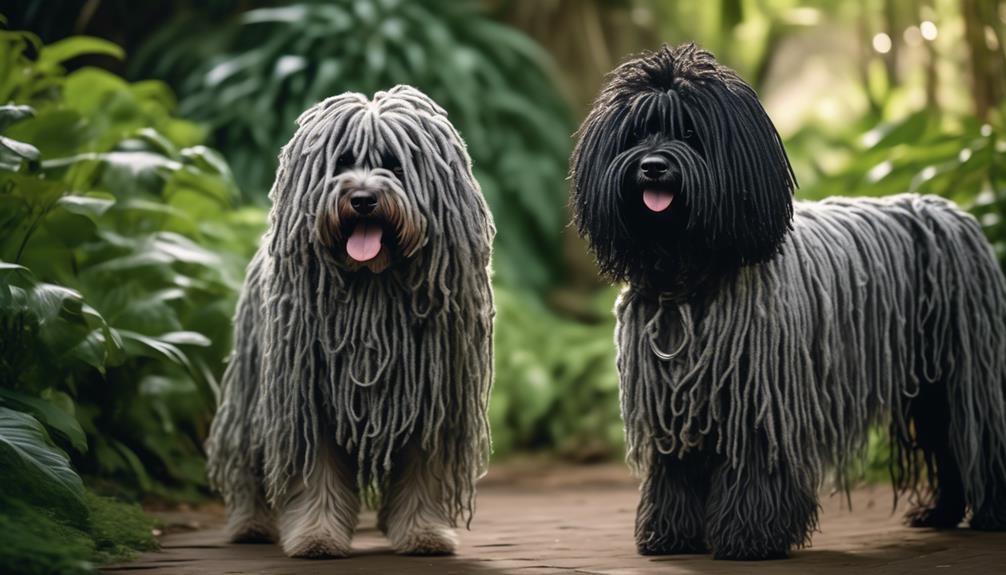
The Puli’s unique coat is characterized by long, corded strands that resemble dreadlocks. This distinctive feature sets them apart from other breeds and adds to their charm. The cords, which are formed by the natural matting and twisting of the fur, serve a practical purpose as well. They provide insulation and protection from cold weather, making the Puli well-suited for outdoor activities. Additionally, the dense and water-resistant coat helps to keep them warm and dry. To give you a better understanding of the Puli’s coat, here is a table showcasing the different coat colors and their descriptions:
| Coat Color | Description |
|---|---|
| Black | Solid black or black with some gray or white hairs |
| Gray | Shades of gray ranging from light to dark |
| White | Pure white, sometimes with cream or yellow shadings |
| Fawn | Light to dark shades of fawn or beige |
The Puli’s coat is truly a unique and striking feature that adds to their overall appeal.
Weather Protection
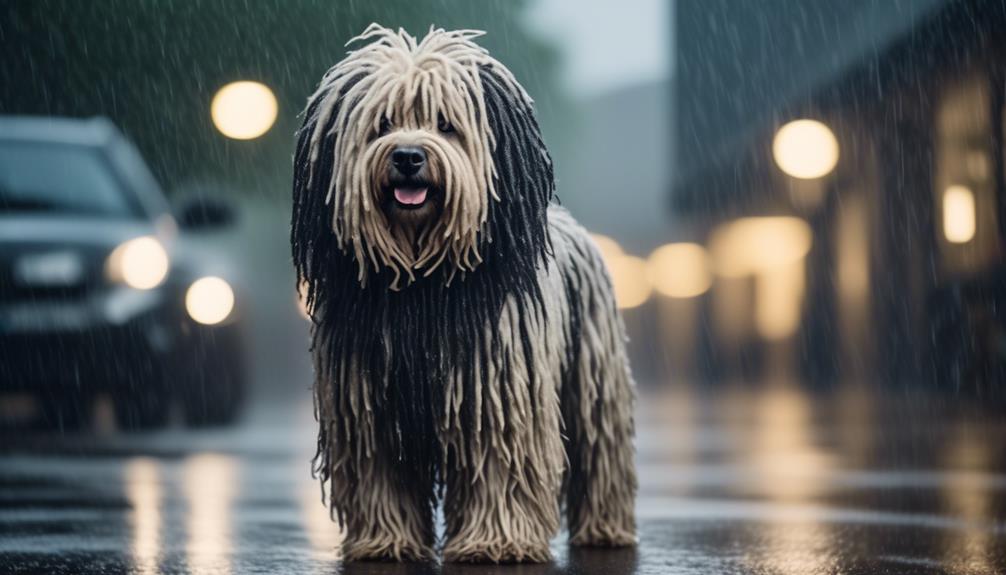
After discussing the unique coat characteristics of the Puli, it’s important to understand how their coat provides weather protection.
- Insulation: The dense and corded coat of the Puli acts as natural insulation, keeping them warm in cold weather. The cords create air pockets that trap heat close to their body, providing an extra layer of warmth.
- Water resistance: The Puli’s coat is also water-resistant, which helps to keep them dry in wet weather. The cords repel water and prevent it from penetrating through to the skin, allowing the Puli to stay comfortable even in damp conditions.
- Wind protection: The thick and heavy coat of the Puli acts as a barrier against strong winds. The cords help to block the wind, keeping it from reaching their body and causing discomfort.
- Sun protection: The Puli’s coat also provides protection against the sun’s harmful rays. The dense cords create a natural shade, shielding the Puli’s skin from excessive sun exposure and preventing sunburn.
Herding Abilities
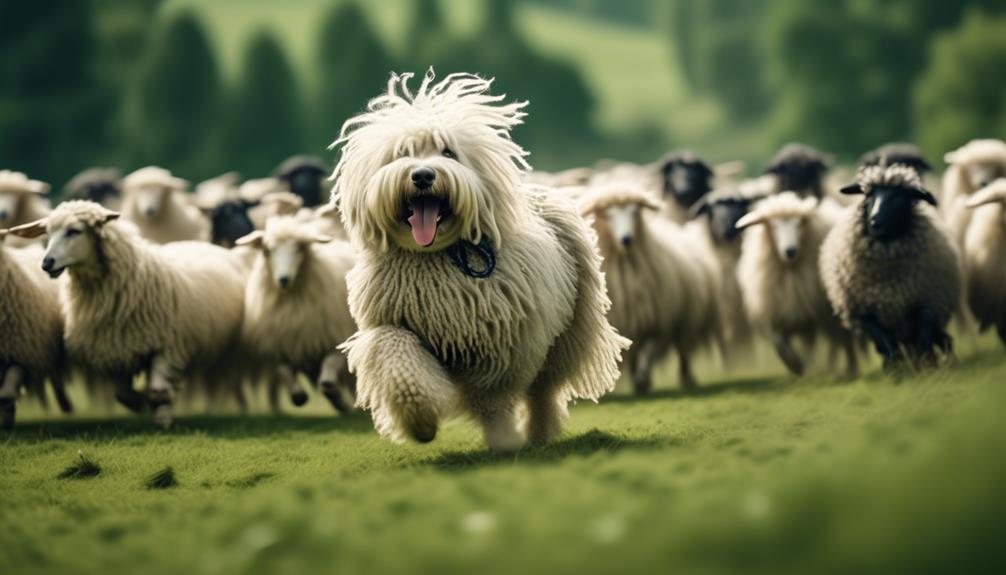
With their origins as Hungarian herding dogs, Puli breeds showcase impressive herding abilities. These intelligent and agile dogs have a natural instinct to gather and control livestock, making them excellent herders.
Pulis are known for their ability to work independently, making quick decisions and adapting to different herding situations. They’ve a strong sense of responsibility and are highly focused on their work.
Their compact size and nimble movements allow them to navigate through challenging terrains with ease. The Puli’s thick and corded coat also serves a purpose in herding, as it provides protection from harsh weather conditions and potential predator attacks.
Whether it’s guiding a flock or rounding up cattle, the Puli’s herding skills are truly remarkable.
Loyal and Affectionate Companions

Loyal and affectionate, Pulis make devoted companions for individuals and families alike. Here are four reasons why they’re such great companions:
- Unwavering loyalty: Pulis are known for their unwavering loyalty to their owners. They’ll stick by your side through thick and thin, providing comfort and support.
- Affectionate nature: These dogs have a naturally affectionate nature and enjoy being close to their loved ones. They thrive on human companionship and love nothing more than cuddling up with their family members.
- Good with children: Pulis have a gentle and patient demeanor, making them excellent companions for children. They’re tolerant of their antics and will happily join in on playtime.
- Gets along with other pets: Pulis generally have a friendly and accepting attitude towards other pets. With proper socialization, they can peacefully coexist with other dogs and animals in the household.
With their loyalty and affection, Pulis make wonderful companions for those seeking a loving and devoted furry friend.
Exercise and Mental Stimulation Needs
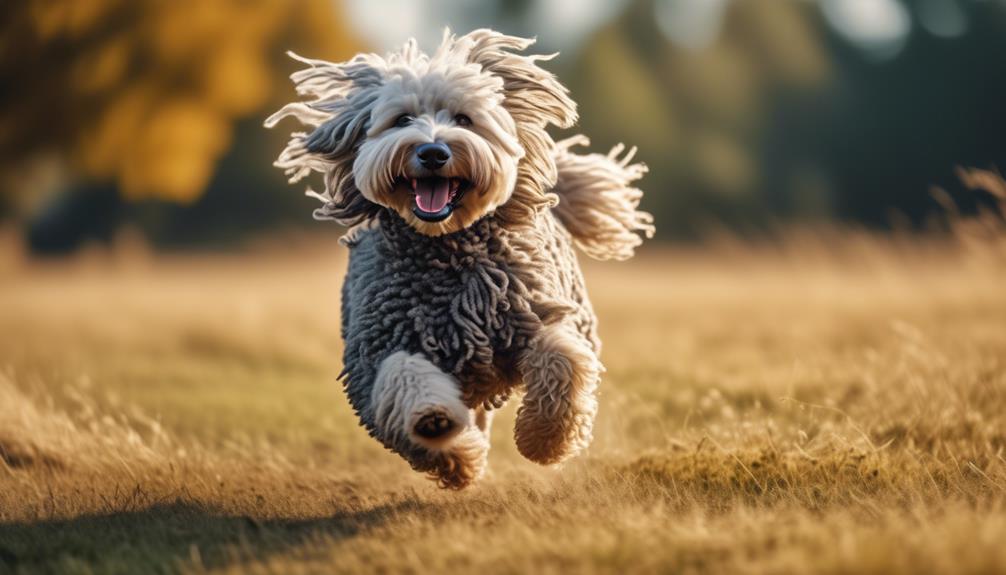
Pulis require regular exercise and mental stimulation to thrive and maintain their overall well-being.
As active and energetic dogs, they need plenty of physical activity to burn off their energy. Daily walks, runs, or play sessions in a fenced yard are essential to keep them physically fit.
In addition to exercise, Pulis also require mental stimulation to keep their intelligent minds engaged. They excel in dog sports such as obedience, agility, and herding trials, where they can showcase their intelligence and agility.
Puzzle toys, interactive games, and training sessions are also great ways to provide mental stimulation for Pulis. Without proper exercise and mental stimulation, Pulis may become bored and exhibit destructive behaviors.
Therefore, it’s important for owners to provide them with plenty of opportunities to keep their minds and bodies active.
Ideal Living Space
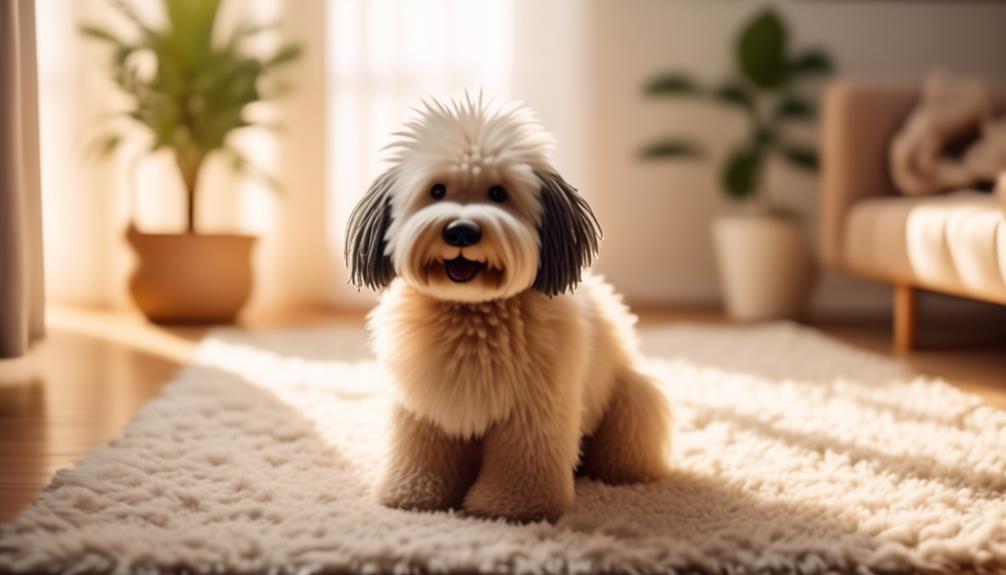
To ensure the well-being of the Puli breed, it’s important to provide them with an ideal living space that caters to their needs for both physical activity and mental stimulation. Here are four key considerations for creating an optimal environment for a Puli:
- Large, fenced yard or farm: Pulis thrive in spacious areas where they can freely roam and explore. A secure, enclosed yard or access to a farm allows them to satisfy their natural instincts and exercise to their heart’s content.
- Mental and physical challenges: Pulis are intelligent and agile, requiring mental and physical stimulation to prevent boredom. Engaging them in dog sports, agility training, and puzzle toys will keep their minds sharp and bodies active.
- Proper training and socialization: This strong-willed breed needs consistent training and early socialization to develop good behavior and interactions with people and other animals.
- Adaptability to smaller spaces: While an expansive living area is ideal, Pulis can adjust to smaller living spaces. However, it’s crucial to provide them with ample exercise opportunities and mental enrichment to prevent destructive behaviors that may arise from boredom.
Adjusting to Smaller Living Spaces
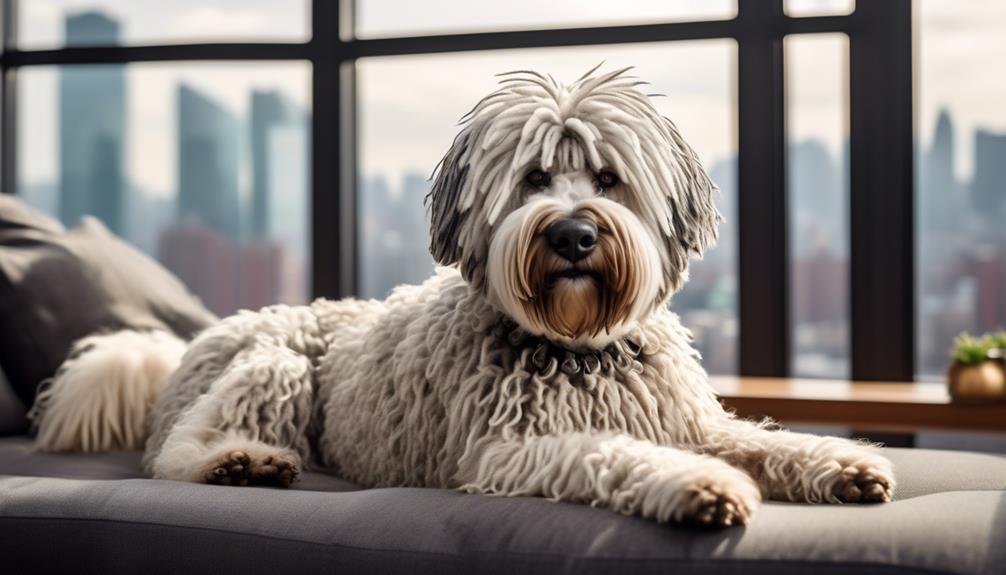
When transitioning to smaller living spaces, Pulis can adapt well with proper exercise and mental stimulation. Although they thrive in larger environments like a large, fenced yard or a farm, Pulis are intelligent and energetic dogs that can adjust to living in apartments or smaller homes.
However, it’s important to note that without enough physical and mental challenges, Pulis may exhibit destructive behaviors due to boredom. To prevent this, owners should provide them with plenty of exercise and mental stimulation through activities like dog sports and puzzle toys.
Additionally, proper training and socialization are essential for this strong-willed breed to ensure they’re well-behaved and adaptable in any living situation.
Training and Socialization Importance
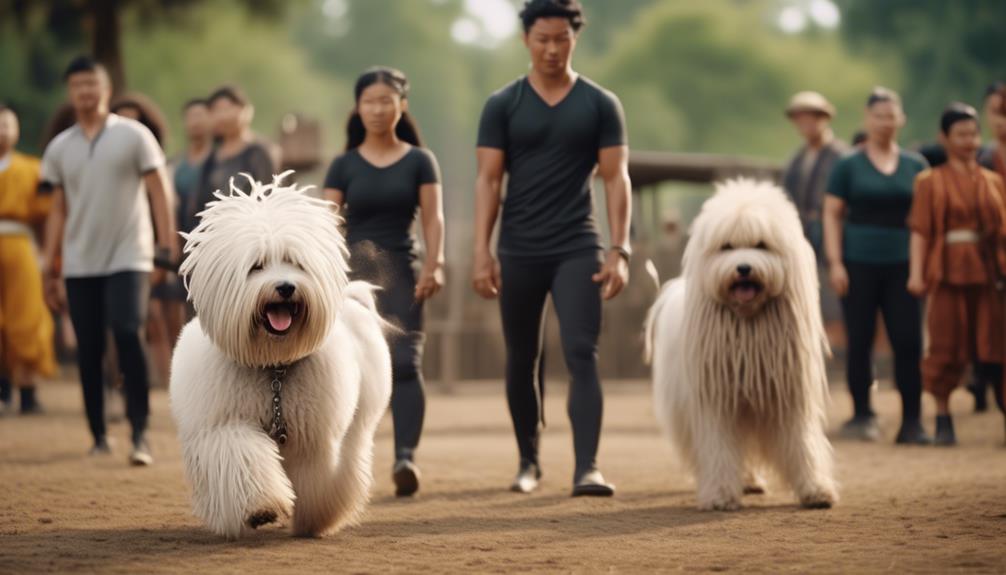
Training and socialization play a crucial role in ensuring that the Puli breed becomes well-behaved and adaptable in any living situation. It’s important to start training and socializing a Puli from a young age to shape their behavior and prevent any potential issues. Here are four reasons why training and socialization are important for Pulis:
- Behavior Management: Proper training helps teach Pulis basic commands, such as sit, stay, and come, which are essential for their safety and the safety of others.
- Mental Stimulation: Training provides mental stimulation for Pulis, which is important for this intelligent breed. Engaging their minds through training exercises and puzzles can help prevent boredom and destructive behaviors.
- Social Skills: Socialization helps Pulis learn how to interact with other dogs and people. It helps prevent fear or aggression towards unfamiliar situations or individuals.
- Adaptability: Training and socialization help Pulis become adaptable in various environments. Whether it’s a busy city street or a quiet countryside, a well-trained Puli can handle different situations with ease.
Feeding and Weight Management
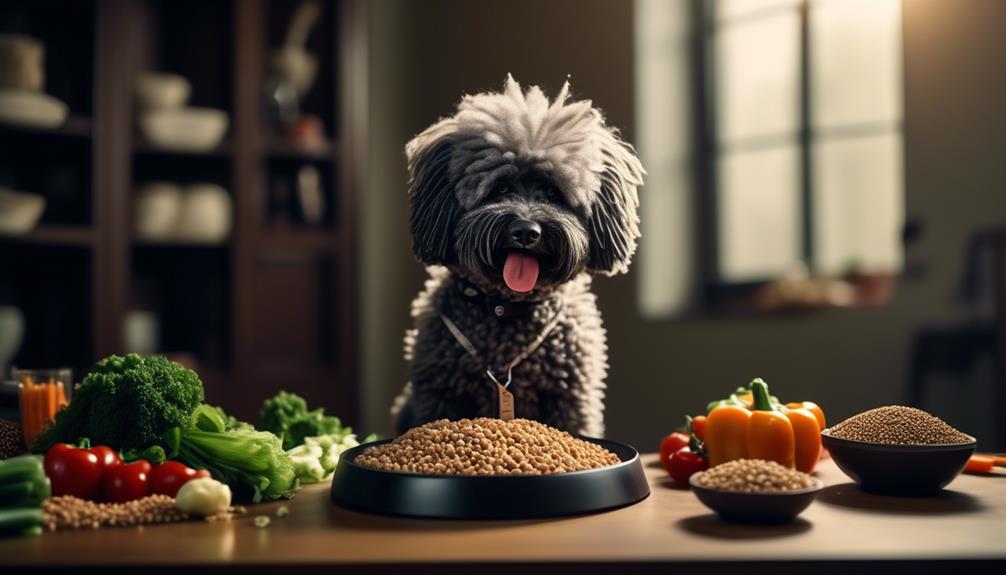
Feeding and managing the weight of a Puli is essential for their overall health and well-being. As a medium-sized breed, Pulis require a balanced and nutritious diet to maintain their energy levels and support their active lifestyle. It’s recommended to feed them twice a day, with the daily amount of food depending on their age, size, and activity level.
Monitoring their weight is important to prevent obesity, which can lead to various health issues. Regular exercise is also crucial to keep them fit and mentally stimulated. Owners should ensure that their Pulis have access to fresh water at all times.
Consultation with a veterinarian can help determine the appropriate diet and feeding routine for a Puli.
Common Health Concerns
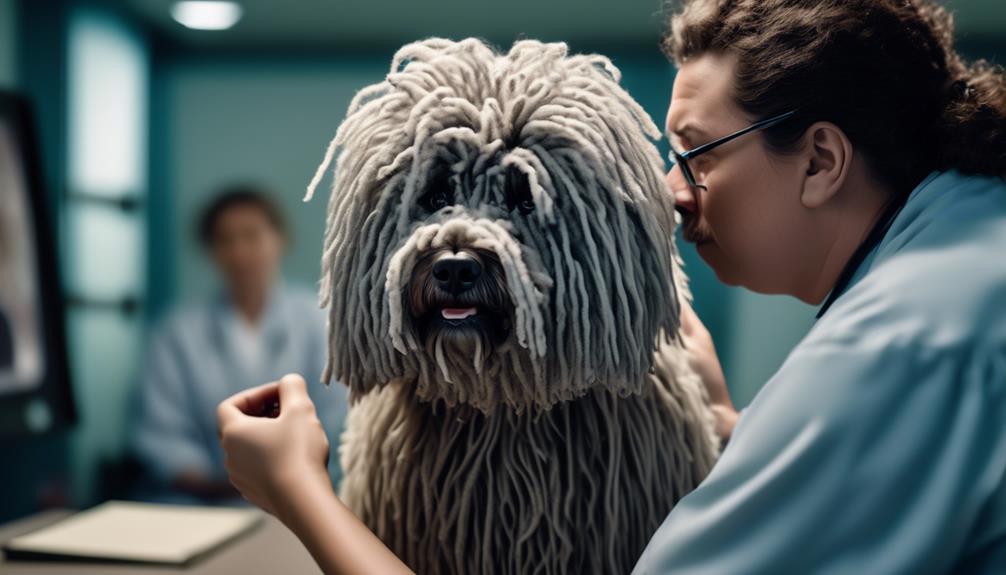
Moving on to the next important aspect of Puli care, it’s essential to address the common health concerns associated with this breed. While Pulis are generally healthy dogs, there are a few conditions that they may be prone to. These include:
- Hip Dysplasia: This is a common condition in many dog breeds, including Pulis. It’s a hereditary condition where the hip joint doesn’t develop properly, leading to pain and mobility issues.
- Progressive Retinal Atrophy (PRA): PRA is a genetic eye disorder that can lead to vision loss and blindness. Regular eye check-ups and genetic testing are important to detect this condition early.
- Cataracts: Pulis can also develop cataracts, which can impair their vision. This condition may require surgical intervention to restore their sight.
- Allergies: Some Pulis may be prone to allergies, including food allergies and environmental allergies. It’s important to provide them with a balanced diet and keep their environment clean to minimize allergic reactions.
Regular vet check-ups and responsible breeding practices can help minimize the risk of these health concerns in Pulis.
Children, Other Pets, and Rescue Opportunities
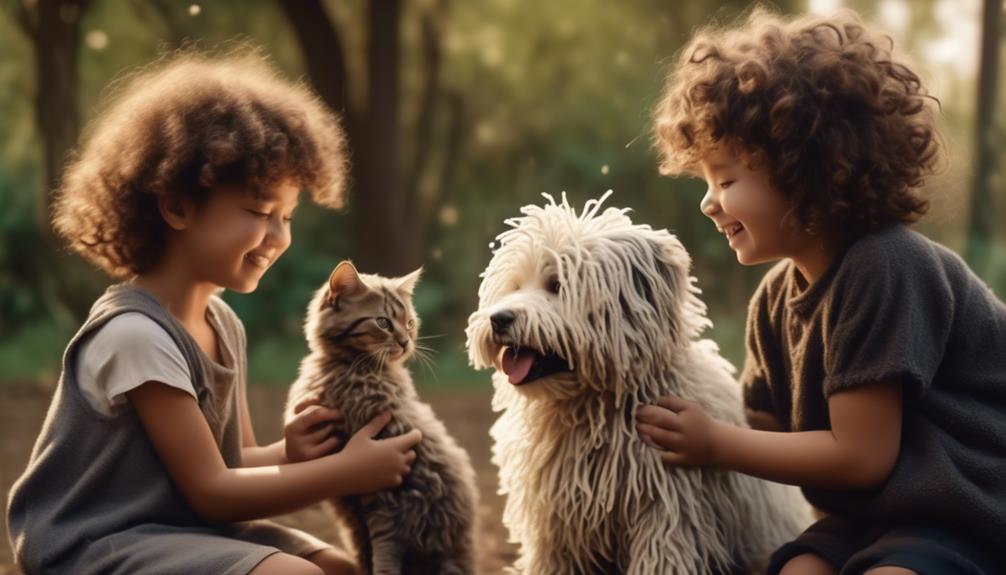
Pulis are known to be friendly and adaptable companions, making them great additions to households with children and other pets. They are well-socialized and well-trained, making them good companions for children. Pulis generally get along with other dogs and pets, but early, positive introductions to other animals are important for acceptance. Additionally, many Puli dogs are in need of adoption or fostering, and rescue organizations can provide information on how to help. It is crucial to find a reputable breeder when considering a Puli, and contacting breed clubs can provide valuable information. Overall, Pulis are a versatile and loving breed that can thrive in a variety of family environments.
| Children | Other Pets | Rescue Opportunities |
|---|---|---|
| Good companions for children | Generally get along | Many Puli dogs need |
| Well-socialized and well-trained | with other dogs and pets | adoption or fostering |
Frequently Asked Questions
Are Pulis Hypoallergenic?
Yes, pulis are hypoallergenic. Their dense and corded coat helps to minimize shedding and reduce dander, making them a suitable choice for individuals with allergies. Regular grooming is still necessary to maintain their unique coat.
Can Pulis Be Left Alone for Long Periods of Time?
Yes, Puli dogs can be left alone for long periods of time, but it is not recommended. They are highly social and thrive on companionship. Leaving them alone for extended periods may lead to separation anxiety and destructive behavior.
How Often Do Pulis Need to Be Groomed?
Pulis need to be groomed regularly due to their unique corded coats. This breed requires special care to maintain the cords, including regular brushing, bathing, and drying. Grooming should be done every few weeks to prevent matting and keep the coat healthy.
Do Pulis Make Good Guard Dogs?
Pulis make good guard dogs due to their protective nature and intelligence. They are known to be loyal and alert, making them excellent at detecting and alerting their owners of potential threats.
Are Pulis Prone to Separation Anxiety?
Yes, pulis are prone to separation anxiety. They form strong bonds with their owners and can become anxious when left alone for long periods. Proper training, socialization, and providing mental stimulation can help alleviate this issue.
Conclusion
In conclusion, the Puli is a fascinating and unique breed with a rich history and distinctive characteristics. With their intelligence, agility, and loyal nature, Pulis make excellent companions and are great with children and other pets.
Their dense and corded coat requires regular care and grooming, and they thrive in an active lifestyle with plenty of exercise and mental stimulation. By understanding their specific needs and finding reputable breeders or rescue organizations, anyone can enjoy the wonderful qualities of a Puli.




